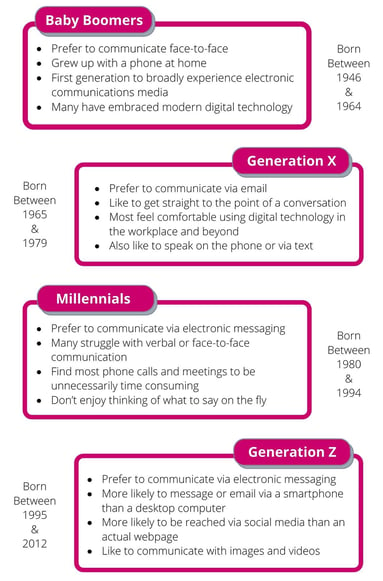Intergenerational Communication
You may have noticed that many young adults you’re in communication with don’t like to talk on the phone. Those who belong to older generations might be curious about why this is. Well, according to a study released by BankMyCell, 81% of Millennials get apprehension anxiety before summoning up the courage to make a call. Some argue that Millennials struggle to connect in more traditional ways because they grew up while sitting in front of screens.
Young professionals themselves, however, claim that they don’t like to be put on the spot and would rather have some time to think everything through before responding to an inquiry. Plus, they don’t want their workday to be disrupted. They’d rather schedule a conversation than be forced to stop part way through a task to field an unexpected phone call. Not to mention that it’s hard to keep a spontaneous phone call private. In many modern, open floor plan offices it’s hard to be sure that no one is listening in. This means the call recipient may have to up and relocate, which can understandably be frustrating.

Because our workforce is made up of multiple generations, which all have different preferred communication styles, this can cause miscommunication. On one hand, Baby Boomers may think that a Millennial is being standoffish, or even rude, by not picking up the phone or taking a while to return a call. On the other hand, sometimes Millennials are right when they say, “that meeting could have been an email,” and they’re really just looking to increase overall productivity. As is the case with many situations, there is no right or wrong. Face-to-face or virtual meetings, text messages, emails, and phone calls are all appropriate in different circumstances.
As convenient as it is, no one can hide behind a screen forever. When the time is right, you have to delete that email draft and pick up the phone, Millennial or not. Here are a couple of examples of situations that would be best handled with a phone call…
- If you have to explain something complicated and/or you anticipate having to answer multiple questions. It’s easier to provide answers all at once over the phone, rather than starting a long email thread. Plus, if you have involved information to relay, like a series of steps, walking through it verbally with the other parties will be the most helpful way to accomplish this.
- If you need to talk about something sensitive, especially if it involves an apology. We’ve all been on the butt end of an insincere apology; you can hear it in the person’s voice. This is not something that can be picked up on in an email. If you want someone to know you’re remorseful, you’ll have to pick up the phone at the very least. A great example of when you might need to apologize to a colleague is if you’ve pushed off responding to them for a good chunk of time. Pick up the phone, apologize for being busy, and address their needs right then and there instead of making them search through their inbox for your long-awaited answer.
Conversely, here are some examples of when communicating via email should be more than sufficient...
- If you can say what you need to in two sentences or less. Phone calls really are a waste of time if it takes you longer to get through the small talk at the beginning and end of the conversation than it does for you to actually relay your message. According to the BankMyCell study, 75% of Millennials avoid phone calls simply because they find them to be too time-consuming.
- If you need to keep organized notes on the subject. When you need to have a conversation that involves tracking assignments or giving specific instructions, email’s your best bet. This way, all involved individuals can refer back to their inboxes if something slips their minds. You’ll be fielding a lot less confused calls by simply sending an email.
While some may think that phone calls provide more human connection than an email, nothing beats a face-to-face conversation. If connection is what you’re really trying to achieve, set up a coffee or lunch date. This also gives both parties a chance to prepare for the conversation. And, it's a great way to make both Baby Boomers and Millennials happy, just make sure not to linger too long before heading back to the office!
Our last piece of advice? Don’t try to turn back time. Figure out the best ways that modern technology can serve you and roll with it! If sending a text message is the only way you’ve been able to successfully reach someone, why bother fighting it when you could just save your energy and communicate with them where they’re at?






Leave a Reply